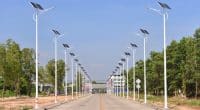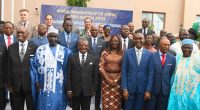In Equatorial Guinea, the Egyptian company Taqa Arabia, which specialises in energy distribution, has just delivered a first wave of five vehicles powered by compressed natural gas (CNG). In this way, the authorities of this Central African country want to meet the energy needs in several sectors, notably transport, at a time when natural gas is becoming important in the energy transition at the international level.
Equatorial Guinea wants to develop the use of natural gas in the transport sector. The country has just received five vehicles powered by compressed natural gas (CNG) under an agreement signed between the Equatorial Guinean Ministry of Mines and Hydrocarbons and the Egyptian company Taqa Arabia, one of the largest private energy distribution companies in Egypt.
The partnership, which was concluded in 2021 on the sidelines of the African Energy Week (AEW) organised in South Africa by the African Energy Chamber (AEC), aims to build CNG fuelling stations for vehicles across Equatorial Guinea by March 2022.
What future for natural gas in mobility?
While oil is the mainstay of the Equatorial Guinean economy, this country of 1.4 million people has a gross domestic product (GDP) of $12.5 billion in 2021 according to the International Monetary Fund (IMF). However, the Central African country is aiming for carbon neutrality by 2050.
This has led the government to increase the number of contracts to explore its gas reserves with the firms Trident Energy, Kosmos Energy and Panoro Energy in order to diversify its energy mix. Natural gas should enable the transport sector to reduce its emissions.
Read also-EQUATORIAL GUINEA: BDEAC lends €122 million for Sendje hydropower plant
Although natural gas generates less than 30-50% of carbon dioxide (CO2) emissions than coal or oil, this energy, although fossil, is used in some countries as an alternative in the ecological transition process. It is this carbon footprint that is used by some specialists to encourage the promotion of a new generation of vehicles such as compressed natural gas (CNG) powered vehicles. Therefore, the future of mobility in Africa, as elsewhere, is hanging on the race between electric vehicles, CNG vehicles and the hydrogen vehicles already on the road in South Africa.
Benoit-Ivan Wansi






